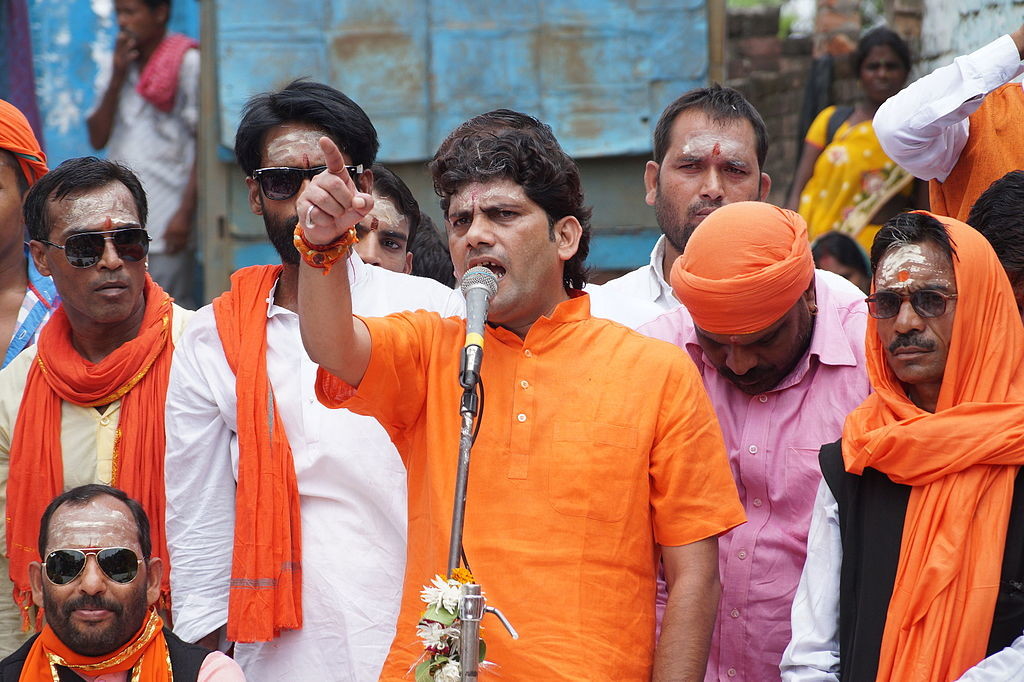On Thursday, I wrote about Bloody Mary, daughter of Henry VIII and violent queen of England during the sixteenth century. Mary resorted to persecuting Protestants (including burning some 280 at the stake) in hopes of ruthlessly establishing herself as ruler of Catholic England. I noted her tactics are alive and well today. Perhaps nowhere is this occurring on a wider scale than the under the Hindutva brand of nationalism in India.
Just last week, a “visibly drunk” campaign official for India’s prime minister threatened to lash out against religious minorities. “I want to teach Muslims a lesson; a lesson that will prove Hindu unity and protect our religion from Islam,” the official said at a rally, as Reuters reported on February 13.
In a brilliant article entitled “The Dangers of Hindu Nationalism,” featured in the March 2016 print edition of First Things, Professor Thomas Albert Howard of Valparaiso University explained how this type of threat fits into Hindutva. Howard said that unlike Hinduism, Hindutva – which he noted literally means “Hindu-ness” – is a “modern phenomenon” that serves as an “ideological construct used to project a unifying identity where traditional forms are diverse and insufficiently pliable to political purpose.”
“In sheer numbers, this movement is among the largest nationalist movements in human history, and the West cannot afford to ignore it,” Howard argued.
Hindutva has taken hold in India in large part thanks to the Bharatiya Janata Party (BJP), the nation’s dominant political party, and its previous radical iterations. The BJP is headed by Prime Minister Narendra Modi, a longtime politician who has a history of involvement with violently persecuting religious minorities.
Modi and the BJP have used Hindutva to their advantage, according to Howard, by preying on “a bitter sense of grievance directed primarily at India’s 180 million Muslims and at other ‘foreign’ religious minorities as well, not least Christians.”
These “foreign” religious minorities make up only a small percentage of the population – Muslims and Christians respectively account for just 14 percent and 2 percent of India’s 1.25 billion people. Yet because they are growing relatively quickly, many Hindus remain wary of these other worldviews disrupting their society. As a consequence, bitter violence has erupted multiple times against religious minorities – particularly Muslims and Christians – in India since the 1990s. Murder, rape, and arson have been perpetrated against these minorities.
Howard noted that not all opposition to religious minorities has been violent. The Indian government has monitored funding from foreign religious groups and multiple Indian states have passed anti-conversion laws carrying stiff penalties. As IRD’s Rick Plasterer noted in June 2014, BJP could also “very possibly” push for a “national anti-conversion law which would make it difficult to convert from Hinduism to any other religion.”
Having recently traveled to India myself, I want to echo Professor Howard’s warning. (You can read some of what else I’ve written based on my experiences here.) Although India enjoys a rich history of religious pluralism, the modern political forces threaten to tarnish the nation’s democratic legacy, established by the likes of Mahatma Gandhi. Western institutions, especially the United States government and the American church, must not remain silent as religious freedom comes under fire in India. They must respectfully defend democracy, free expression, and religious tolerance for all faiths in all corners of the world.
Despite the discouraging political trends in India, I agree with Professor Howard that “Indian Christians and their supporters abroad need not view their situation as a hopeless cause.” I think that we – as these “supporters abroad” – need to hear this reminder most of all. During my trip to India, the attitude of the Indian Christians I met was one of joyful perseverance. They held fast to their faith, committed to continue ministering despite the memory of past persecution and the prospect of more in the future.
May we support their faith, and may God reward them for it.





Comment by J. Alejandro on February 21, 2016 at 11:23 pm
Interesting.